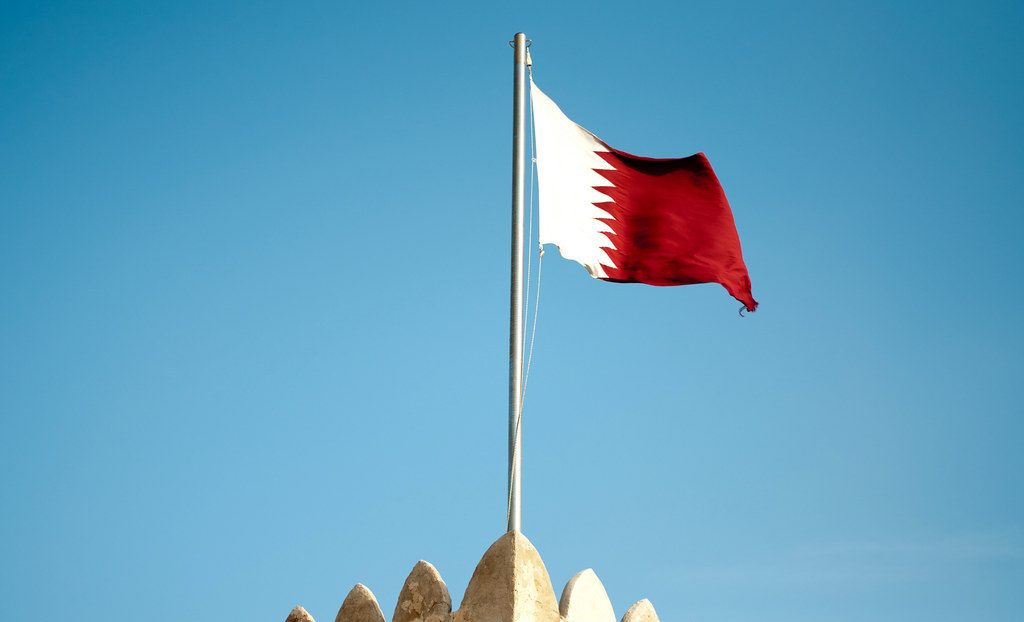Qatar expresses deep concern over regional tensions following Iran’s retaliatory attack on Israel, calling for de-escalation and international intervention amid rising fears of a wider regional conflict.
Qatar has expressed its “deep concern” over the latest regional developments on Sunday following a tense night in the region after Iran launched a retaliatory attack on Israel.
In a statement, Qatar’s Ministry of Foreign Affairs “called on all parties to halt escalation, promote calm, and exercise maximum restraint.”
The Gulf state also urged the international community “to take urgent action to defuse tension and de-escalate the situation in the region.”
“The Ministry also reiterates the State of Qatar’s commitment to supporting all regional and international efforts to achieve regional and international security and stability,” the statement added.
Iran acted upon its promise to retaliate against Israel following the bombing of its consulates in Damascus on April 1. The Israeli attack killed seven members of Iran’s Revolutionary Guards (IRGC), including two generals.
Saturday’s retaliatory attack marked the first direct Iranian military attack on its rival, Israel.
The attack also came hours after the IRGC seized the Portuguese-flagged MSC Aries vessel, which it said was “linked to Israel” and was moving into Iran’s territorial waters.
In a video published on Saturday, Iran’s supreme leader Ayatollah Ali Khamenei said that “the malicious Zionist regime will be punished.”
Moments before the Iranian attack, several countries temporarily closed off their airspace until the next morning, including Jordan, Lebanon, and Iraq, raising a state of panic, especially among travellers at the airports.
Some airlines have also been forced to re-route their trips to avoid the tense area, aviation experts said on social media.
Iran then launched 170 drones, more than 30 cruise missiles, and more than 120 ballistic missiles, Israel’s military spokesman Daniel Hagari confirmed, claiming Israel “intercepted 99 percent of the launches”.
Iran’s state media reported that the country’s drone and missile attacks dealt “heavy blows” to an air base in the Negeb (Negev) desert.
The United States, the United Kingdom and France also helped down some drones and missiles.
In a statement, U.S. Secretary of Defense Lloyd Austin confirmed the missiles were also launched from Iraq, Syria and Yemen.
“We condemn these reckless and unprecedented attacks by Iran and its proxies, and we call on Iran to immediately halt any further attacks, including from its proxy forces, and to deescalate tensions,” Austin said.
The missiles and drones fired by the IRGC targeted Israel’s Navatim Airbase, according to Iran’s news agency (IRNA).
Sirens were also heard in the northern West Bank and the Dead Sea near the Jordanian border, according to the Associated Press.
Two hours after launching the attack, Iran confirmed that it concluded its response in accordance with Article 51 of the United Nations Charter, which permits legitimate defence.
Despite this, the UN Security Council is holding a meeting on Sunday in response to Israel’s request to discuss Iran’s attack.
“Iran’s military action was in response to the Zionist regime’s aggression against our diplomatic premises in Damascus. The matter can be deemed concluded. However, should the Israeli regime make another mistake, Iran’s response will be considerably more severe,” Tehran’s UN mission said.
“It is a conflict between Iran and the rogue Israeli regime, from which the U.S. must stay away!” it added.
The IRGC also accused the UN and international bodies of “silence and neglect” in their response towards the Israeli attack on Iran’s consulate in the Syrian capital.
Notably, Iran has been advancing its Unmanned Air Force while developing multi-role drones. This includes the replica of the U.S. MQ-9 Reaper drone, dubbed the Shahed-149 or Gaza drone, as a tribute to Gaza.
Western condemnations
Iran’s attack was met with condemnations especially from Israel’s Western allies, despite their failure to condemn Tel Aviv’s ongoing crimes against Palestinians in the West Bank and Gaza.
In a statement, U.S. President Joe Biden condemned the attacks on Israel after speaking to Israeli Prime Minister Benjamin Netanyahu. In the phone call, Biden reaffirmed “America’s ironclad commitment to the security of Israel.”
“I told him that Israel demonstrated a remarkable capacity to defend against and defeat even unprecedented attacks – sending a clear message to its foes that they cannot effectively threaten the security of Israel,” he said.
A senior administration official separately told CNN that Biden “made clear the U.S. will not participate in any offensive operations against Iran.”
President of the European Union Commission Ursula von der Leyen condemned “Iran‘s blatant and unjustifiable attack on Israel.”
“I call on Iran and its proxies to immediately cease these attacks. All actors must now refrain from further escalation and work to restore stability in the region,” she said on X.
UK Foreign Secretary David Cameron described Iran’s attack as “reckless” while saying it “will only further inflame tensions in the Middle East.”
Meanwhile, UN Secretary-General Antonio Guterres condemned what he described as a “serious escalation.”
“I call for an immediate cessation of these hostilities. Neither the region nor the world can afford another war,” he said.
Regional tensions on the rise
Tensions in the Middle East have been on the rise since Israel launched its genocidal war on Gaza on October 7, 2023. Israel has since killed at least 33,686 people in Gaza while wounding 76,309 others and displacing more than 80 percent of the population.
The war was followed with flare-ups in the Red Sea and Yemen with the Houthi rebels in addition to cross-border attacks between Hezbollah and Israel in southern Lebanon.
The groups in Lebanon, Syria, Yemen, Gaza and Iraq fall under what is widely known as the “axis of resistance” – an informal anti-Israel coalition.
Fears over a wide-scale regional war have been echoed by the international community over the past six months, with the ceasefire talks having yet to yield any breakthrough.
To date, Israel has been rejecting Hamas’s demand for a complete ceasefire in exchange for the release of the remaining 130 Israeli captives.







